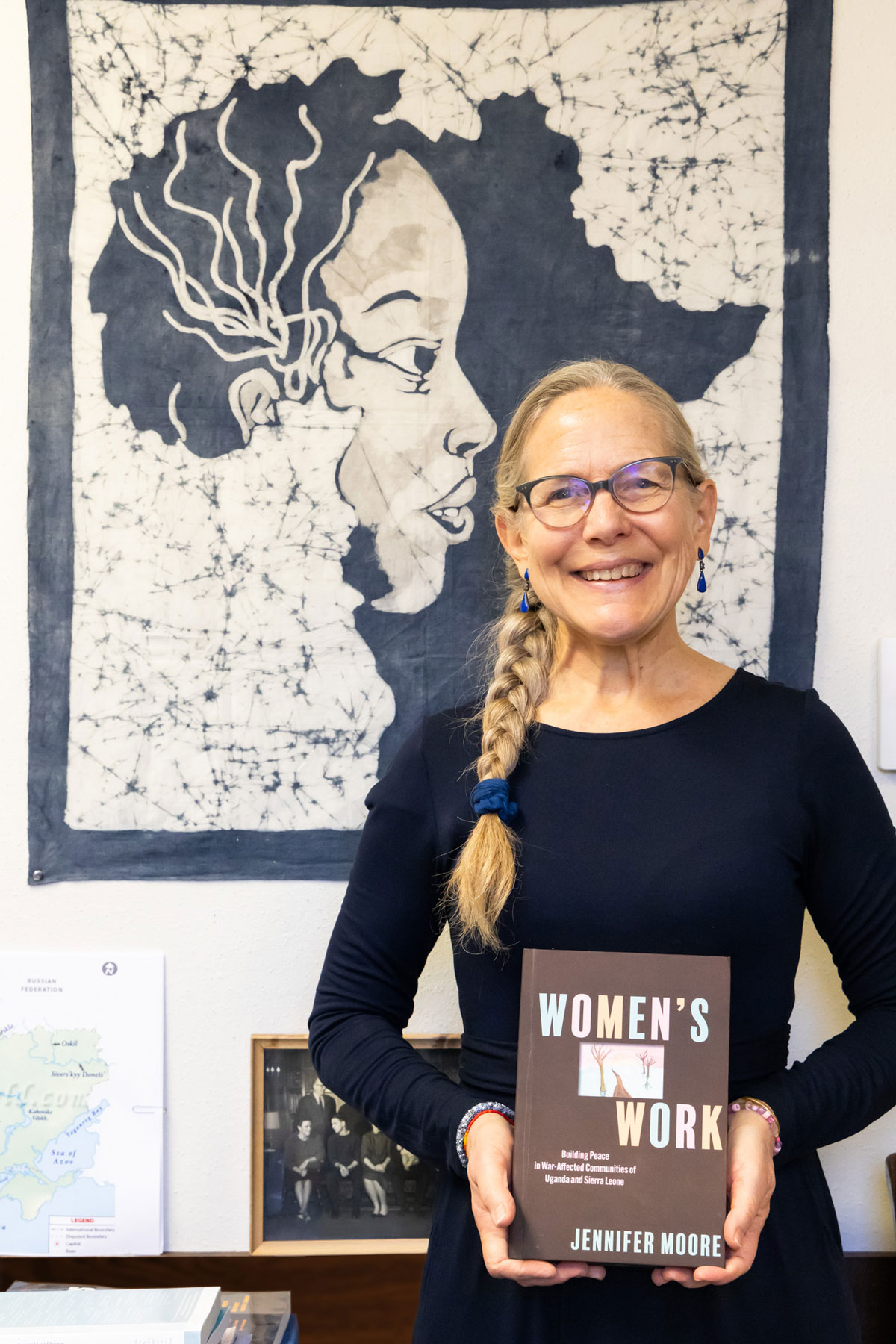School of Law Professor Jennifer Moore Publishes Her Book Women’s Work: Building Peace in War-Affected Communities of Uganda and Sierra Leone
March 31, 2025

Professor Jennifer Moore recently released a book titled Women’s Work: Building Peace in War-Affected Communities of Uganda and Sierra Leone, which was published earlier this month by the University of Pennsylvania Press.
In Women’s Work, Professor Moore documents a vision of peacebuilding and transformative justice as practiced in the daily lives of women farmers and microentrepreneurs who survived the prolonged and brutal civil conflicts in Northern Uganda and Sierra Leone that raged from the 1980’s until the early 2000’s. Through a series of in-person interviews with grassroots women activists conducted over yearly visits from 2016-2023, Professor Moore identifies common themes in their community-building efforts, focusing on collective survival through micro credit and collaborative agriculture, psychosocial healing through talking circles and celebratory dancing, and conflict resolution through mediation and women’s empowerment. These women reject a formula for transitional justice that prioritizes individual punitive approaches and instead advocate for a peacebuilding model that emphasizes collective material well-being, state accountability, and community reconciliation.
Professor Moore also highlights the essential role of legal equality for women and healthy partnerships between women and men in sustaining societal transformation. She notes that among the 20 peace-builders she interviewed most extensively, a common refrain was that while women were happy to lead peacebuilding efforts in their communities, they often felt that they were carrying the entire burden. Instead, their dream was to share the load equally with the men in their communities. Until that day, however, their greatest strength comes from one another, working together to create revolving credit funds, to mill and sell cassava flour, to mediate land disputes, or to conduct workshops on women’s inheritance and integrity rights.
Professor Moore earned her J.D. from Harvard Law School in 1987. Before joining the UNM law faculty in 1995, she worked for the U.N. High Commissioner for Refugees (UNHCR) as an Associate Protection Officer in Conakry, Guinea, from 1991-1993, where she worked with refugees from the Liberian and Sierra Leonean civil wars; and as an Associate Legal Officer in in Washington, D.C., from 1993-1995, where she conducted training sessions for government officials and immigrant advocates on refugee law.
While in West Africa in the 1990’s, Professor Moore witnessed the resilience of refugees forced to flee armed conflict in their communities. Over 30 years later, many of those refugees have long since returned home, to pick up the pieces of their lives in the aftermath of peace accords, war crimes trials and truth and reconciliation hearings. Over this same period, as a law professor at UNM, Professor Moore became deeply interested in the aftermath of such crises. She began asking questions about how war survivors define for themselves what constitutes a peaceful and just transition to a healthy life.
As she continued her advocacy for refugees and explored the concept of transitional justice, Professor Moore built connections with women’s groups such as the Peace Mothers of Sierra Leone and the Women’s Advocacy Group of Northern Uganda. From 2016-2023, over a span of nearly ten years, she visited Uganda four times and Sierra Leone six times, conducting interviews with women activists in ten communities—five in Northern Uganda’s Acholi region and five in Sierra Leone’s Moyamba and Koinadugu Districts.
Reflecting back on the wisdom she has learned from the Peace Mothers and women advocates of Sierra Leone and Northern Uganda, Professor Moore shares this simple message, “Peace doesn’t come from on high or through governmental fiat. Nor is peace simply the absence of armed conflict. Peace is made piecemeal, through small and large acts of collective survival and conflict resolution. Women peacebuilders know that the peace they will see is largely the peace they create themselves, incrementally and devotionally, every day, through collective action in their communities.”
Professor Moore aims to have portions of Women’s Work translated into Acholi and Krio, the languages commonly spoken in Northern Uganda and Sierra Leone, respectively, so that the communities she has worked with and the friends she has made can have the chance to hear their voices represented.
Professor Moore is also the author of Humanitarian Law in Action within Africa, a book that examines how humanitarian and human rights law function as tools for conflict resolution and transitional justice in countries emerging from prolonged civil wars. This book was published by Oxford University Press in 2012.
Women’s Work Building Peace in War-Affected Communities of Uganda and Sierra Leone can be purchased here. Use code PENN-JMOORE30 for a 30% discount.
